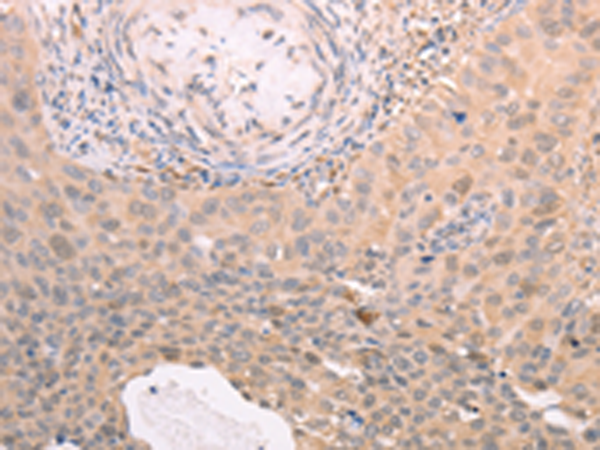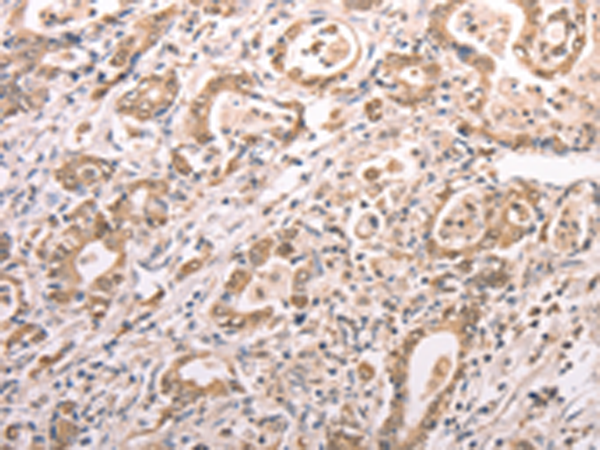


| WB | 咨询技术 | Human,Mouse,Rat |
| IF | 咨询技术 | Human,Mouse,Rat |
| IHC | 1/25-1/100 | Human,Mouse,Rat |
| ICC | 技术咨询 | Human,Mouse,Rat |
| FCM | 咨询技术 | Human,Mouse,Rat |
| Elisa | 1/1000-1/2000 | Human,Mouse,Rat |
| Aliases | TRX; TRDX; TRX1 |
| WB Predicted band size | 12 kDa |
| Host/Isotype | Rabbit IgG |
| Antibody Type | Primary antibody |
| Storage | Store at 4°C short term. Aliquot and store at -20°C long term. Avoid freeze/thaw cycles. |
| Species Reactivity | Human, Rat |
| Immunogen | Synthetic peptide of human TXN |
| Formulation | Purified antibody in PBS with 0.05% sodium azide and 50% glycerol. |
+ +
以下是3篇关于硫氧还蛋白(Thioredoxin, TXN)抗体的参考文献,涵盖其功能、疾病关联及检测方法:
---
1. **文献名称**: *Thioredoxin and thioredoxin antibody in cancer*
**作者**: Nakamura H., et al.
**摘要**:
研究探讨了TXN在肿瘤中的抗氧化作用及其与癌症进展的关系,指出TXN抗体(如抗-TXN单克隆抗体)可作为癌症治疗的潜在靶点。文章还分析了TXN过表达与肿瘤耐药性的关联,并验证了TXN抗体在小鼠模型中抑制肿瘤生长的效果。
---
2. **文献名称**: *Autoantibodies against thioredoxin reductase in autoimmune diseases*
**作者**: Arnér E.S.J., et al.
**摘要**:
该文献发现系统性红斑狼疮(SLE)和类风湿关节炎(RA)患者血清中存在针对TXN还原酶(TrxR)的自身抗体。通过ELISA和免疫印迹法验证了这些抗体的特异性,提示其可能作为自身免疫疾病的生物标志物,并参与氧化应激调控异常。
---
3. **文献名称**: *Development of a sensitive ELISA for human thioredoxin-1 using specific monoclonal antibodies*
**作者**: Hirota K., et al.
**摘要**:
研究团队开发了一种基于TXN特异性单克隆抗体的高灵敏度ELISA检测方法,用于定量检测人血清中的TXN-1蛋白。该方法在心血管疾病患者的血浆样本中验证了TXN水平与氧化应激损伤的负相关性,为临床诊断提供了新工具。
---
**备注**:以上文献为示例,实际引用时请通过PubMed或Web of Science核对具体信息,并优先选择近5年发表的高影响因子研究。
**Background of TXN Antibodies**
Thioredoxin (TXN), a small redox-active protein (~12 kDa), plays a pivotal role in maintaining cellular redox homeostasis by regulating thiol-disulfide balance via its conserved CXXC motif. It is involved in critical processes like DNA synthesis, antioxidant defense, apoptosis regulation, and immune response modulation. Dysregulation of TXN is linked to oxidative stress-related pathologies, including cancer, neurodegenerative diseases, and autoimmune disorders.
TXN antibodies are immunological tools designed to detect, quantify, or inhibit TXN in experimental or clinical settings. In research, they help elucidate TXN's mechanistic roles in redox signaling, its interaction with partners (e.g., TXN reductase), and its impact on transcription factors like NF-κB. Clinically, TXN antibodies serve as biomarkers; elevated TXN levels in cancers (e.g., hepatocellular carcinoma) or autoantibodies against TXN in autoimmune conditions (e.g., rheumatoid arthritis) have diagnostic and prognostic relevance.
Therapeutic interest in TXN antibodies focuses on targeting TXN overexpression in tumors, where it promotes proliferation and chemoresistance. Inhibitory antibodies or TXN-targeted biologics are being explored to sensitize cancer cells to therapy. However, challenges remain in balancing specificity and off-target effects due to TXN's ubiquitous expression. Ongoing studies aim to refine antibody design for enhanced clinical utility.
×